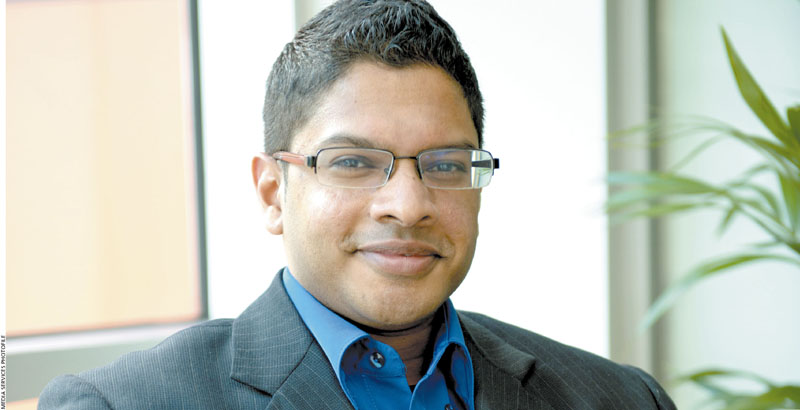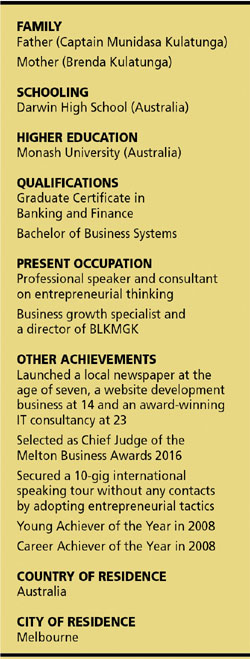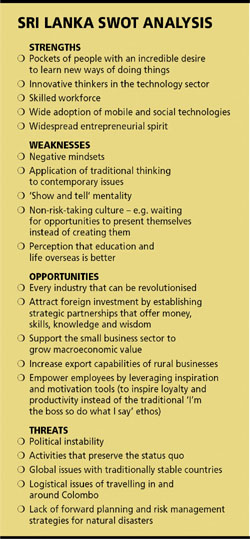SRI LANKANS OVERSEAS

NOTHING IS IMPOSSIBLE!
Arjuna Kulatunga calls on Sri Lankans to espouse their entrepreneurial spirit

Q: How do you perceive Sri Lanka in the light of progress it is making?
A: As a professional speaker and consultant on entrepreneurship, I’m excited by the opportunities in Sri Lanka for achieving unprecedented economic growth.
Every industry in the country has the potential to be revolutionised through innovation. But the primary challenges that are facing Sri Lanka are overcoming traditional mindsets, and navigating outdated thinking to survive and thrive in the world we live in today.

Q: By the same token, how do compatriots down under view Sri Lanka?
A: Australia is a very diverse nation and so Sri Lanka is viewed in different ways depending on whom you ask. Most Australians are aware that Sri Lanka exists because of cricket, curry and ‘that Dilmah bloke.’
Some have visited the island on holiday and experienced its natural beauty as well as traditional Sri Lankan hospitality. But a few place it in the cauldron of issues that are facing Australia’s current immigration policy.
Q: What were your impressions of the island on your last visit?
A: The Sri Lanka I knew while growing up never constructed freeways or new buildings, or had three wheelers with meters in them. Much has changed in the country; but sadly, some things have not. There is too much negativity and the default answer to any question is still ‘no’ or ‘it can’t be done.’
During my recent ‘Nothing is Impossible’ speaking tour in Sri Lanka, I had to surmount this challenge several times a day to get things done.
For example, when I requested a whiteboard for one of my seminars, the technician at the venue firmly said “there’s no whiteboard, Sir.” But having engaged with him in a conversation that stepped through the logic behind his ‘no’ and presenting him with solutions to overcome the barriers he continued to throw back at me, he soon found the whiteboard I needed. Interactions such as these that waste valuable time, money and energy need to be changed by encouraging people to think differently and communicate accordingly.
Q: Why is there still no reversal of the issue of brain drain?
A: Brain drain occurs because of an outdated cultural perception. Throughout history, Sri Lanka has been colonised by several powerful nations that have instructed us on how to think, feel and behave in a manner that served them well.
While we may have achieved physical independence 69 years ago, mentally our culture still perceives developed countries like the UK, Australia and the US as being better than Sri Lanka.
That may have been the case in the past; but given the emerging political, economic and social beliefs in these three countries, the so-called ‘good life’ on offer is about to be severely compromised – and with it the prestige of studying, working and living overseas will soon diminish.

Q: How can Sri Lankans living overseas be enticed to contribute or return to their country of birth?
A: What attracted me to return to the country was by studying the growth opportunities that are available in terms of what I wanted to achieve during the next stage of my entrepreneurial career.
This is also how some of the larger new and cool companies such as Kapruka and CodeGen have been birthed. Their CEOs were educated overseas, but they returned to Sri Lanka to create their companies because they understood how to build a business model that leverages the strengths of the country to achieve their strategic outcomes.
By doing so, they have created employment opportunities and paved the way for others to do the same. If these opportunities were communicated to expatriates – perhaps through Sri Lanka’s high commissions and embassies – then more people would be enticed to contribute or return to their country of birth.
Q: In your assessment, on what should Sri Lanka focus most in the coming decade?
A: The country needs to develop more entrepreneurial thinkers but not by using the traditional understanding of entrepreneurship. Most people think entrepreneurship is merely about making money by launching a business. Rather, it is about the process of taking an idea and achieving an outcome by bringing down the barriers that exist between the idea and outcome.
I call this The Entrepreneurial Mind™ framework, which is how great entrepreneurs such as Sir Richard Branson, Steve Jobs and Bill Gates think to achieve results. Sri Lanka needs to adopt this way of thinking.
Q: Finally, what are your hopes for the nation in the post-conflict era?
A: My hope for the country is that Sri Lankans open their entrepreneurial minds. Entrepreneurs are creative, innovative thinkers who are capable of achieving amazing outcomes while navigating challenging circumstances.
Imagine how different the country would be if we had such people in key leadership positions inspiring others to do the same. As I said during my tour, “nothing is impossible when you view the world through the eyes of an entrepreneur.”





Leave a comment